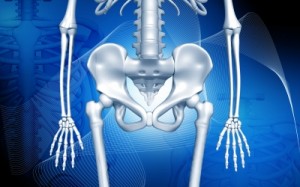Gassy, painful stomach bloating from indigestion may mean that you need more of an essential vitamin in your blood supply. If your gut feels like a war zone, then experts recommend getting tested for vitamin B12 deficiency, a form of anemia linked to gastritis.
B12 deficiency in the gut
To digest vitamin B12 from food, you need to have a healthy ecosystem in your gastrointestinal tract. Good bacteria winning the battle over the bad, proper absorption of nutrients, and all that.
But for many, damage to the parietal cells of the stomach, acid reflux, and medication overuse lead to a vicious cycle of vitamin B12 anemia that feeds into constant symptoms of fatigue, stomach bloating, sore muscles, dizziness, and memory problems.
Symptoms of pernicious anemia include stomach bloating, and also diarrhea, heartburn, brain fog, painful numbness in the hands and legs, cognitive impairments, and more.
Stomach bloating and other symptoms
The following symptoms, if they occur often, may indicate a breakdown in your digestive system that requires immediate treatment in order to prevent vitamin B12 deficiency anemia:
- Acid reflux
- Heartburn
- Vomiting
- Abdominal pain
- Chest pains
- Shortness of breath
- Nausea
- Stomach bloating
- Hardening of the stomach
- Loss of appetite
- Difficulty swallowing
- “Lump” in your throat
- Diarrhea
- Constipation
- Frequent burping
- Flatulence
Vitamin B12 malabsorption
Foods that contain vitamin B12 are meats, chicken, fish, milk, and eggs. Generally, as long as you eat a steady non-vegan diet, you’re guaranteed a plentiful supply of vitamin B12 for good health…
…Unless you suffer from vitamin B12 malabsorption. The inability to break down vitamin B12 happens when you don’t have enough intrinsic factor, a digestive enzyme produced in your stomach that helps to grab vitamin B12 from food and “escort” it through your intestines and into your blood supply.
Gastritis (stomach inflammation) is one of the most common causes of vitamin B12 malabsorption.
Yes- stomach damage can cause vitamin B12 deficiency.
What Causes Vitamin B12 Malabsorption?
Gastrointestinal disorders
If you suffer from inflammatory bowel disease (IBD), such as Crohn’s disease or ulcerative colitis, then your risk of becoming ill from pernicious anemia– severe vitamin B12 deficiency- is greater than most.
Damage to the walls of the stomach and intestinal tract, particularly the bottommost part (ileum), makes it impossible to get crucial vitamin B12 into your blood stream without direct insertion of nondietary liquid vitamin B12 supplements.
Other illnesses that cause enough gastrointestinal distress to interfere with vitamin B12 absorption include fibromyalgia, migraines, celiac, lupus, and chronic stomach ulcers.
Gastro surgery
If you’re an IBD patient who has elected for corrective surgery to treat chronic stomach bloating, indigestion, ulcers, and stomach pain, then you must supplement with high doses of vitamin B12 from a reliable source, in order to prevent becoming anemic.
Weight loss surgery recipients who undergo gastric bypass are also included in that risk category for pernicious anemia.
Autoimmune disorders
You may not able to get enough vitamin B12 simply because your body identifies intrinsic factor as a danger, and attacks it. If you suffer from immune system dysfunctions such as rheumatoid arthritis, lupus, or celiac disease, then it’s important to get your vitamin B12 levels checked regularly.
Better yet, begin a routine of supplemental vitamin B12 as a preventive measure against pernicious anemia. There’s no danger of taking too much vitamin B12, since it is safe in all amounts.
Please tell us…
Have you been experiencing stomach bloating and other signs of digestive disorders, but didn’t realize they were connected to vitamin B12 deficiency?
If you suffer from gastrointestinal issues such as Crohn’s disease, gastroesophageal disorder (GERD), or ulcerative colitis, do you feel that you ‘re getting enough vitamin B12 from your doctor to combat deficiency?
Image by Ohmega1982

